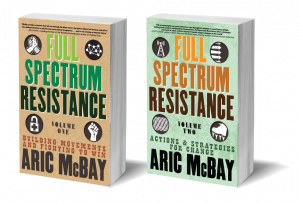We fight because it’s right. Whenever abuses and atrocities are committed by those in power, defiance is a moral imperative.
Remember the Milgram experiments of the 1960s? Psychologist Stanley Milgram and his colleagues wanted to see if regular people, instructed by a person in authority, would give a fatal electric shock to a stranger. In their initial experiments, almost every participant complied and turned the (simulated) electrical current up to a lethal level.
But in a second experiment, they added another variable: an actor who would sit alongside the participant during the experience. That actor’s job was to refuse to proceed with the experiment when the electric shocks became dangerous. When the actor refused, almost all of the participants followed their example and stopped the experiment.
Resistance spreads. The Occupy movement. Idle No More. Black Lives Matter. One person’s defiance can inspire another. One person’s resistance can allow many other people to stand firm. Victory should always be the goal. But even when there is no clear path to success, resistance is still right. You can’t win unless you try. And acts of defiance can the keep the embers of resistance alive even when the fire is at its lowest ebb.
We fight because we are part of a tradition. Wherever there has been oppression and occupation, there has been resistance. From the Visgoths to the abolitionists, from the Mau Mau to the Dakota war parties, from the civil rights sit-ins to the desperate uprisings in Nazi concentration camps, some people always fight back. Any basic rights we possess—the right to vote, to sit at whichever lunch counter we please, to speak dissent openly, the right not to be owned by someone else—have been won by earnest struggle.28 They exist because people have defied authority and organized against oppression. People have fought, have been tortured, and been imprisoned, have been killed. They have lost decades of their lives in prison. They have lost limbs. They have lost their families. They have lost everything and kept on fighting.
There is a fashionable belief in some circles that fighting back does not work, that social change comes from the goodwill of those in power and from historical inevitability. As I will argue in the chapters to come, this is a gross distortion of historical reality. It is in affront to the memory of those who have sacrificed to win us the freedoms we have. And it is, above all, a delusion that must be jettisoned before it dooms our social justice struggles and our planet.
Think of all those who have laid down their lives in the struggle against empire and mass exploitation. Think of Ken Saro-Wiwa, murdered by Nigeria and Shell because he stood up for the people of the Niger Delta. Think of Sophie Scholl, hanged by the Nazis for her role in the White Rose Society. In the moment before her execution, she said: “Such a fine, sunny day, and I have to go. But what does my death matter, if through us thousands of people are awakened and stirred to action?”
It seems wrong to speak of courageous people like Scholl and Saro-Wiwa on the same page as those who claim that it is impossible to fight back. Countless people, both famed and anonymous, have given their lives to fight for a better future. We owe them something in return; honesty, at the very least.
We must fight even when we don’t think we can win. If we back down, then we teach those in power that they can walk all over us, and we give younger people a terrible example. When we resist, even if we lose that particular battle, we show that we will fight so that next time those in power may pause and reconsider, so that our allies will remember that they are part of a history of resistance.
We must fight because no victory against oppression is ever final. There will always be reactionaries and conservatives who want to roll back the progress we’ve made—to recover the power and privilege of their past or to “make America great again.” We’ve seen that with Trump and the alt-right. With the police shootings of unarmed people of color that still occur on a weekly or daily basis decades after the civil rights movement.
But, conversely, we must also remember that every victory—even a partial victory—will give us something to build on, will get us closer to a world of true equality and genuine justice.
Resistance is a tradition that extends deep into the past, and it will continue far into the future (presuming we can keep the planet intact enough to support future generations). We take a risk when we act, but we gain something for generations to come.


